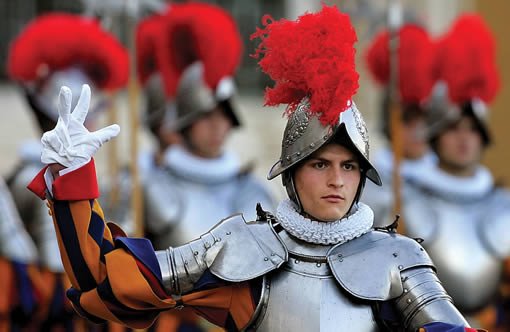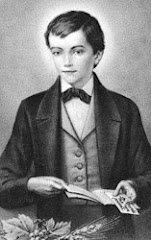RELIGION, AN INSPIRATION AND DRIVING FORCE IN U.S. HISTORYVATICAN CITY, 16 APR 2008 (VIS) - Shortly before 10.30 a.m. local time today, Benedict XVI arrived at the White House, official residence of U.S. President George W. Bush who, together with his wife Laura, was on hand to welcome the Pontiff.
The Pope, who celebrates his 81st birthday today, delivered an address from a podium on the South Lawn of the White House. Among those present, apart from the civil and political authorities, were U.S. cardinals, the Presidium of the United States Conference of Catholic Bishops (USCCB), the auxiliary bishops of Washington, and the bishop of Arlington within whose diocese is the cemetery in which thousands of U.S. servicemen and various presidents are buried. The ceremony was attended by a total of around 5,000 people.
Having expressed his appreciation for President Bush's invitation "to visit this great country", the Holy Father recalled how his journey coincides with the 200th anniversary of the elevation of the country's first Catholic diocese, Baltimore, to a metropolitan archdiocese. He went on: "I am happy to be here as a guest of all Americans. I come as a friend, a preacher of the Gospel and one with great respect for this vast pluralistic society.
"America's Catholics", he added, "have made, and continue to make, an excellent contribution to the life of their country. ... I trust that my presence will be a source of renewal and hope for the Church in the United States, and strengthen the resolve of Catholics to contribute ever more responsibly to the life of this nation.
"From the dawn of the Republic, America's quest for freedom has been guided by the conviction that the principles governing political and social life are intimately linked to a moral order based on the dominion of God the Creator". In the process which forged the soul of the nation, "religious beliefs were a constant inspiration and driving force, as for example in the struggle against slavery and in the civil rights movement. In our time too, particularly in moments of crisis, Americans continue to find their strength in a commitment to this patrimony of shared ideals and aspirations".
Referring to the many religious traditions present in the United States, Benedict XVI recalled how "not only Catholics, but all believers have found here the freedom to worship God in accordance with the dictates of their conscience, while at the same time being accepted as part of a commonwealth in which each individual and group can make its voice heard".
He continued: "As the nation faces the increasingly complex political and ethical issues of our time, I am confident that the American people will find in their religious beliefs a precious source of insight and an inspiration to pursue reasoned, responsible and respectful dialogue in the effort to build a more humane and free society.
"Freedom is not only a gift, but also a summons to personal responsibility. Americans know this from experience - almost every town in this country has its monuments honouring those who sacrificed their lives in defence of freedom, both at home and abroad. The preservation of freedom calls for the cultivation of virtue, self-discipline, sacrifice for the common good and a sense of responsibility towards the less fortunate. It also demands the courage to engage in civic life and to bring one's deepest beliefs and values to reasoned public debate".
"The Church, for her part, wishes to contribute to building a world ever more worthy of the human person", said the Holy Father, because "she is convinced that faith sheds new light on all things" and gives us "the hope that inspires us to work for an ever more just and fraternal society. Democracy can only flourish", he added, "when political leaders and those whom they represent are guided by truth and bring the wisdom born of firm moral principle to decisions affecting the life and future of the nation.
"For well over a century, the United States of America has played an important role in the international community", the Pope concluded, noting how "America has traditionally shown herself generous in meeting immediate human needs, fostering development and offering relief to the victims of natural catastrophes. I am confident that this concern for the greater human family will continue to find expression in support for the patient efforts of international diplomacy to resolve conflicts and promote progress".
The welcome ceremony over, the Pope held a private meeting with President Bush in the Oval Office. He them travelled back to the apostolic nunciature in Washington where he lunched with U.S. cardinals and the Presidium of the USCCB. Later, also in the apostolic nunciature, he received leaders of five charitable organisations: the Knights of Columbus, the Patrons of the Arts, Centesimus Annus Pro Pontefice, the Papal Foundation and the Franciscan Foundation for the Holy Land.
PV-U.S.A./WELCOME CEREMONY/WASHINGTON VIS 080417 (820)
JOINT U.S. - HOLY SEE COMMUNIQUE
VATICAN CITY, 16 APR 2008 (VIS) - At the end of the private meeting between the Holy Father Benedict XVI and U.S. President George W. Bush in the Oval Office of the White House, the Holy See and the Office of the President of the United States of America released a joint declaration, the text of which is given below:
"President Bush, on behalf of all Americans, welcomed the Holy Father, wished him a happy birthday, and thanked him for the spiritual and moral guidance, which he offers to the whole human family. The President wished the Pope every success in his apostolic journey and in his address at the United Nations, and expressed appreciation for the Pope's upcoming visit to 'Ground Zero' in New York.
"During their meeting, the Holy Father and the President discussed a number of topics of common interest to the Holy See and the United States of America, including moral and religious considerations to which both parties are committed: the respect of the dignity of the human person; the defence and promotion of life, matrimony and the family; the education of future generations; human rights and religious freedom; sustainable development and the struggle against poverty and pandemics, especially in Africa. In regard to the latter, the Holy Father welcomed the United States' substantial financial contributions in this area. The two reaffirmed their total rejection of terrorism as well as the manipulation of religion to justify immoral and violent acts against innocents. They further touched on the need to confront terrorism with appropriate means that respect the human person and his or her rights.
"The Holy Father and the President devoted considerable time in their discussions to the Middle East, in particular resolving the Israel-Palestinian conflict in line with the vision of two States living side-by-side in peace and security, their mutual support for the sovereignty and independence of Lebanon, and their common concern for the situation in Iraq and particularly the precarious state of Christian communities there and elsewhere in the region. The Holy Father and the President expressed hope for an end to violence and for a prompt and comprehensive solution to the crises which afflict the region.
"The Holy Father and the President also considered the situation in Latin America with reference, among other matters, to immigrants, and the need for a co-ordinated policy regarding immigration, especially their humane treatment and the wellbeing of their families".
PV-U.S.A./MEETING PRESIDENT/WASHINGTON VIS 080417 (410)
MEETING WITH BISHOPS: LIVE CHRIST-CENTRED LIVESVATICAN CITY, 16 APR 2008 (VIS) - At 5.45 p.m. local time (11.45 p.m. in Rome), the Holy Father presided at the celebration of Vespers with bishops of the United States at the National Shrine of the Immaculate Conception in Washington D.C.
At the beginning of his homily, the Holy Father highlighted the American people's "great vitality and creativity" and their generosity towards the poor and needy, which also finds expression in "the many forms of humanitarian assistance provided by American Catholics through Catholic Charities and other agencies".
"America is also a land of great faith" said the Pope, noting how its people are well-known for "their religious fervour" and "do not hesitate to bring moral arguments rooted in biblical faith into their public discourse". At the same time, "respect for freedom of religion is deeply ingrained in the American consciousness".
"People today need to be reminded of the ultimate purpose of their lives", said Pope Benedict. "Without God ... our lives are ultimately empty. ... The goal of all our pastoral and catechetical work, the object of our preaching, and the focus of our sacramental ministry should be to help people establish and nurture that living relationship with 'Christ Jesus, our hope'".
He went on: "At a time when advances in medical science bring new hope to many, they also give rise to previously unimagined ethical challenges. This makes it more important than ever to offer thorough formation in the Church's moral teaching to Catholics engaged in healthcare". In this context he told the bishops that "yours is a respected voice that has much to offer to the discussion of the pressing social and moral questions of the day. ... It falls to you to ensure that the moral formation provided at every level of ecclesial life reflects the authentic teaching of the Gospel of life".
In this regard, the Pope identified a "matter of deep concern to us all" as being "the state of the family within society. ... Divorce and infidelity have increased, and many young men and women are choosing to postpone marriage or to forego it altogether". At the same time there exists "an alarming decrease in the number of Catholic marriages in the United States together with an increase in cohabitation, in which the Christ-like mutual self-giving of spouses, sealed by a public promise to live out the demands of an indissoluble lifelong commitment, is simply absent".
"It is your task to proclaim boldly the arguments from faith and reason in favour of the institution of marriage, understood as a lifelong commitment between a man and a woman, open to the transmission of life. This message should resonate with people today, because it is essentially an unconditional and unreserved 'yes' to life, a 'yes' to love, and a 'yes' to the aspirations at the heart of our common humanity, as we strive to fulfil our deep yearning for intimacy with others and with the Lord.
"Among the countersigns to the Gospel of life", the Pope added, "found in America and elsewhere, is one that causes deep shame: the sexual abuse of minors" by the clergy. "It is your God-given responsibility as pastors to bind up the wounds caused by every breach of trust, to foster healing, to promote reconciliation and to reach out with loving concern to those so seriously wronged".
"While it must be remembered that the overwhelming majority of clergy and religious in America do outstanding work in bringing the liberating message of the Gospel to the people entrusted to their care, it is vitally important that the vulnerable always be shielded from those who would cause harm".
Children, said the Holy Father, "have a right to be educated in authentic moral values rooted in the dignity of the human person. ... We need to reassess urgently the values underpinning society, so that a sound moral formation can be offered to young people and adults alike. ...Indeed, every member of society can contribute to this moral renewal and benefit from it".
Turning his attention to priests, the Pope highlighted the fact that they too "need your guidance and closeness during this difficult time. ... At this stage a vital part of your task is to strengthen relationships with your clergy, especially in those cases where tension has arisen between priests and their bishops in the wake of the crisis. It is important that you continue to show them your concern, to support them, and to lead by example".
"We need to rediscover the joy of living a Christ-centred life, cultivating the virtues and immersing ourselves in prayer", the Pope concluded his homily. "Time spent in prayer is never wasted, however urgent the duties that press upon us from every side".
During the course of his meeting with the U.S. prelates, three bishops posed questions to the Holy Father.
In the first question, the Holy Father was asked to give his assessment of the challenges of secularism and relativism, and his advice on how to confront these challenges more effectively.
"Perhaps", he replied, "America's brand of secularism poses a particular problem: it allows for professing belief in God, and respects the public role of religion and the Churches, but at the same time it can subtly reduce religious belief to a lowest common denominator. Faith becomes a passive acceptance that certain things 'out there' are true, but without practical relevance for everyday life. The result is a growing separation of faith from life. ... This is aggravated by an individualistic and eclectic approach to faith and religion: far from a Catholic approach to 'thinking with the Church', each person believes he or she has a right to pick and choose".
"What is needed, I am convinced, is a greater sense of the intrinsic relationship between the Gospel and the natural law on the one hand, and, on the other, the pursuit of authentic human good, as embodied in civil law and in personal moral decisions. In a society that rightly values personal liberty, ... the Gospel has to be preached and taught as an integral way of life, offering an attractive and true answer, intellectually and practically, to real human problems. ... I believe that the Church in America, at this point in her history, is faced with the challenge of recapturing the Catholic vision of reality and presenting it, in an engaging and imaginative way, to a society which markets any number of recipes for human fulfilment".
The second question put to the Pope concerned Catholics' abandonment of the practice of the faith, sometimes by an explicit decision, but often by distancing themselves quietly and gradually from attendance at Mass and identification with the Church.
"It is becoming more and more difficult, in our Western societies, to speak in a meaningful way of 'salvation'", said Benedict XVI. "Yet salvation - deliverance from the reality of evil, and the gift of new life and freedom in Christ - is at the heart of the Gospel. We need to discover, as I have suggested, new and engaging ways of proclaiming this message. ... It is in the Church's liturgy, and above all in the Sacrament of the Eucharist, that these realities are most powerfully expressed and lived in the life of believers; perhaps we still have much to do in realising the Council's vision of the liturgy as the exercise of the common priesthood and the impetus for a fruitful apostolate in the world".
Finally, answering a question on the decline in vocations, Pope Benedict recalled how "the ability to cultivate vocations to the priesthood and the religious life is a sure sign of the health of a local Church" and he reaffirmed the importance of prayer. "Nor am I speaking only of prayer for vocations", he added. "Prayer itself, born in Catholic families, nurtured by programs of Christian formation, strengthened by the grace of the Sacraments, is the first means by which we come to know the Lord's will for our lives".
Before concluding the Pope also acknowledged "the immense suffering endured by the people of God in the archdiocese of New Orleans as a result of Hurricane Katrina, as well as their courage in the challenging work of rebuilding". He also presented Archbishop Alfred Hughes of New Orleans with a chalice, "as a sign of my prayerful solidarity with the faithful of the archdiocese".
PV-U.S.A./VESPERS BISHOPS/WASHINGTON VIS 080417 (1400)








 " ...over the past six months or so, readers in our Parish have begun to say "the word of the Lord" or just "word of the Lord" instead of "This is the Word of the Lord" which has been the norm, since I was little. Our priest also now says "the Gospel of the Lord" leaving out the 'this'. I heard it on EWTN in a brodcast they did from a live coverage of Mass somewhere (not EWTN itself) and I just wondered, seeing that it seems 'global' if you know of any specific announcement or change calling for it or if you have come across this new phenomenon yourself, if so, why is it? All of the readers now have changed to this in our Parish and it just got my attention when I heard it from America too! "
" ...over the past six months or so, readers in our Parish have begun to say "the word of the Lord" or just "word of the Lord" instead of "This is the Word of the Lord" which has been the norm, since I was little. Our priest also now says "the Gospel of the Lord" leaving out the 'this'. I heard it on EWTN in a brodcast they did from a live coverage of Mass somewhere (not EWTN itself) and I just wondered, seeing that it seems 'global' if you know of any specific announcement or change calling for it or if you have come across this new phenomenon yourself, if so, why is it? All of the readers now have changed to this in our Parish and it just got my attention when I heard it from America too! "










